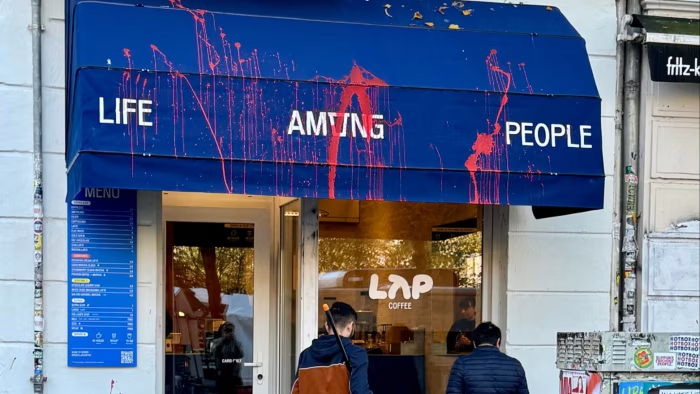Unlock the Editor’s Digest for free
Roula Khalaf, Editor of the FT, selects her favourite stories in this weekly newsletter.
A series of attacks on a nascent Berlin coffee chain backed by venture capital has sparked a lively debate about German attitudes to entrepreneurship.
The shopfronts of 15 LAP Coffee outlets were splattered with red paint last weekend in what appeared to be a co-ordinated assault by perpetrators whose identity and motives remain unknown. The chain, which pitches itself as a disrupter offering cheap but high quality coffee, had previously been targeted by an online campaign called “LAP Coffee? Shit!”
The group describes the company, backed by investors including New York-based Insight Partners, as the “tech industry’s aggressive attempt to take over another part of our lives, to push out local independent cafés, and to make big profits for founders and investors”.
The attacks triggered an outpouring of anger from the German start-up scene. Paula Hübner Wehmeyer, a New York-based venture capital investor, said in a video on LinkedIn that the controversy “tells me so much about the German attitude to entrepreneurship”.
Dozens of others piled in, with one founder in the German capital claiming that “a €2.50 cappuccino is apparently too disruptive for Berlin”.
The row partly represents a clash between two sides of Berlin. It is a techno city that prides itself on its gritty countercultural vibe, but has also become a hub for start-up founders over the past two decades. It has faced soaring rents and widespread gentrification.
The debate has shone a light on Germany’s efforts to shake off a long period of economic stagnation and promises by new chancellor Friedrich Merz to boost innovation.
While Europe’s largest economy lags significantly behind the US and the UK in terms of venture capital deal volume, Dirk Schumacher, chief economist at the development bank KfW, pointed out that the German VC market had developed significantly over the past 10 to 15 years.
He said that Germany now had a record 32 unicorns — start-ups with valuations above $1bn. However, that figure pales in comparison with the 729 in the US and 313 in China at the end of 2024, according to PitchBook data.
While Germany still has fewer venture capital deals than many of its international peers, Schumacher said this had more to do with the lack of large private pension pools and university endowments than social or political attitudes. He described the LAP coffee row as a “tempest in a teapot”.
Yet some start-up founders and their backers say there are grains of truth in the cries of anti-entrepreneurship that must be addressed if Germany — and Europe more broadly — is to have any hope of keeping pace with its rivals.
Kai Eberhardt, chief executive and co-founder of the medical app developer Oviva, recently spent close to €7mn to obtain a new data protection certificate from German authorities. “Of course patients must be protected, but the process was opaque and frustrating,” he said. “Entrepreneurship is celebrated and supported in the US. In Europe, failure is punished far more harshly.”
Jeannette zu Fürstenberg, one of the godmothers of the German VC scene, said that the country “still lacks the density of companies capable of scaling into truly massive valuations or revenues”.
Although successive governments had made promises and launched schemes to support start-ups, she said: “Public equity financing is too bureaucratic, too sluggish, and not ambitious enough in scale.”
Herbert Mangesius, general partner and co-founder of Vsquared Ventures, said that Germany’s real challenge “isn’t a lack of entrepreneurial spirit, but the system itself.” He added: “Anyone trying to start a business here — whether it’s a coffee shop or a deep tech start-up — faces high costs, bureaucracy, and complex regulation.”
LAP’s critics say that it is absurd and dishonest to turn the debate into one about Germany and its pro- or anti-business credentials. They say that they are not opposed to innovation, but object to the chain’s business model, which they say is an exploitative attempt to push into residential areas and force out local independent rivals.
“They’re just collecting data and numbers so that they can get so big that at some point that they can sell,” said Philipp Reichel, who founded a Berlin roastery and also owns an independent coffee shop.
Reichel said that the LAP model was not even innovative. He points to the venture capital-backed Blank Street coffee, which has more than 80 branches in the US and the UK, and Luckin Coffee, the Chinese chain that now has more than 24,000 outlets globally.
LAP’s opponents and the company itself can agree on one thing: that this particular row may say more about Berlin and the city’s unique character than about Germany as a whole.
“We don’t see these issues happening in other cities,” said LAP co-founder Ralph Hage, who has also opened stores in Hamburg and Munich. “Berlin is its own bubble.”
